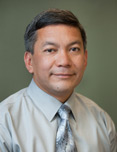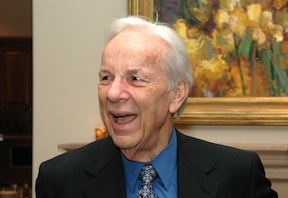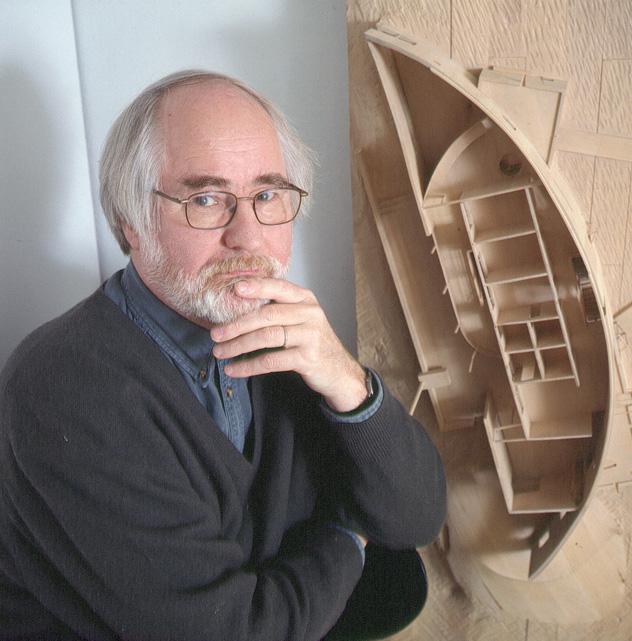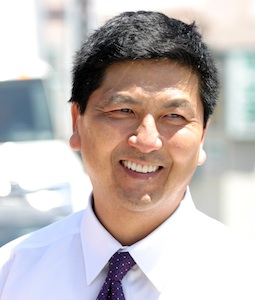Daily Business Report-Feb. 6, 2014
Rendering of the Pio Pico Energy Center slated for Otay Mesa.
PUC Clears Way for New Power Plant in Otay Mesa
The state Public Utilities Commission gave its unanimous blessing Wednesday to an energy purchase agreement that clears the way for construction of a 305-megawatt power plant in Otay Mesa. The 5-0 vote by the CPUC approves a 25-year deal between San Diego Gas & Electric and the Pio Pico Energy Center. Terms calls for the plant to be functional by Sept. 1 next year, with the flow of electricity to SDG&E starting in 2017. Until then, Pio Pico will be considered a merchant generator, selling on the wholesale market, CPUC President Michael Peevey said.
Environmentalists opposed the plant, contending the loss of supply from San Onofre should be filled by renewable sources. “Now, SDG&E ratepayers in San Diego face financial and environmental burdens for at least the next 25 years, and all Californians will feel this ripple effect on our climate, our health and our economy,” said San Ysidro resident Roddy Jerome, in a statement put out by the Environmental Health Coalition.
The coalition claims the plant will create more pollution in the South Bay, put ratepayers on the hook for at least $1.6 billion and have a detrimental impact on climate change. — City News Service report
San Diegan Named to a Top State Post by Gov. Brown

Tony Perez of San Diego, an attorney with a long history of administrative jobs at California universities, has been appointed by Gov. Brown to be undersecretary at the California Government Operations Agency, the agency that oversees a huge bureaucracy that includes the state’s Franchise Tax Board, Department of General Services, Department of Human Resources and the Public Employees’ Retirement System.
Perez, 49, a Republican, will be paid $153,888 a year. His last work was at the Wake Forest Baptist Medical Center’s Wake Forest School of Medicine, where he held multiple positions, including vice president of academic administration and operations and senior associate dean of administration and operations.
Perez also held multiple positions at the UC San Diego from 2008 to 2012, including assistant vice chancellor for health sciences affairs and chief health sciences counsel. He held multiple positions at the UC Davis from 2001 to 2008, including chief compliance officer, director of institutional review board administration and health system counsel.
He was an adjunct faculty member at the University of San Francisco from 2002 to 2006 and an attorney at Murphy Austin Adams Schoenfeld from 1998 to 2001, at Diepenbrock Wulff Plant and Hannegan in 1998 and at Kronick Moskovitz Tiedemann and Girard from 1997 to 1998.
Perez was manager of legislation and public information at the California Department of Fair Employment and Housing from 1995 to 1997. He earned a law degree from the University of the Pacific, McGeorge School of Law.
Conrad Prebys Gives $20 Million to San Diego State

Philanthropist Conrad Prebys has donated $20 million to San Diego State University — the largest single gift it has ever received — that will endow scholarships benefiting around 150 students a year. In exchange, the new student union building that opened last month will be called the Conrad Prebys Aztec Student Union.
“The idea of scholarships for students intrigued me, because I know how difficult it is going to college right now,” Prebys said. “Back when I was going to school, it was no big deal to work while you were going to school. Now it can’t be done, really. It’s very difficult and expensive.”
Prebys’ gift will be used for scholarships to help former foster youths, student veterans, those pursuing biomedical research and engineering, those studying creative and performing arts, student entrepreneurs and leaders, and those in the SDSU Honors program.
Prebys is a longtime financial supporter of San Diego institutions, including KPBS, UC San Diego, the San Diego Zoo, Boys and Girls Club, Old Globe Theater, La Jolla Music Society, San Diego Opera, Scripps Mercy Hospital, Scripps Prebys Cardiovascular Center, Sanford-Burnham Medical Research Institute and the Salk Institute.
The gift pushes the total for the multi-year Campaign for SDSU to $465 million. The fundraising campaign has a goal of $500 million.
— KPBS report
Interim Mayor Asks San Diegans to Step Up Water Conservation
San Diegans have been good at conserving water in recent years but will have to step up their game because of the statewide drought, interim San Diego Mayor Todd Gloria said Wednesday, City News Service reports. “I need to thank all of you for your successful efforts over the past several years to save water and I need to ask you to continue your conservation and even challenge you to ramp it up, given the significant water supply challenges facing our state,” Gloria said.
Gloria said he will resurrect the city’s Water Consumption Report Card and provide regular updates on how San Diegans are doing in cutting back their usage.
Water officials in San Diego have said that mandatory conservation measures, such as those implemented during the last drought in 2009, will not be necessary for now because the local water supply is stable.
Supervisors Approve Background-Check
Certification for Foreign Student Pilots
County supervisors unanimously approved a new law Wednesday designed to help make sure that foreign students learning to fly at county airports are undergoing federal background checks. The federal government has legal authority over aviation in the United States and requires anyone who is not a citizen to undergo background checks before they can take flight training. However, in 2012, a report issued by the federal Government Accounting Office stated there were “concerning” gaps in that background-check system — more than a decade after the 9/11 attacks.
The ordinance supervisors approved Wednesday will require flight schools that train foreign student pilots at any of the county’s eight airports to sign a form every year stating they are complying with the federal background-check law. “We have more reason today than ever before to have this certification in place,” board Chairwoman Dianne Jacob said. “It’s simple, it’s not adding bureaucracy (and) it’s not doing the job of the federal government. That is certainly not our role.”
The County ordinance must be approved a second time when the Board meets Feb. 26. County Department of Public Works officials said they would begin enforcing the new ordinance when the new fiscal year begins July 1. Public Works operates the county’s airport system. Public Works officials said there are 14 private flight schools and roughly 1,200 flight instructors working at county-operated airports.
North County Economic Summit Set for March 5
CARLSBAD — The San Diego North Economic Development Council will hold its first North County Economic Summit on March 5 from 7:30 to 10:30 a.m. at the Sheraton Carlsbad Resort & Spa in Carlsbad. Three panels will be held, one focusing on the national and state economies, another on high-tech in North County and the last on economic development/real estate in the region.
Finnish Architect Featured at NewSchool of Architecture and Design

Finnish architect, educator and critic Juhani Pallasmaa will deliver a public lecture and participate in a discussion period on Feb. 19 at the auditorium of the NewSchool of Architecture and Design, 1249 F St. in Downtown San Diego. The programs are free.
Pallasmaa, the 1999 recipient of the International Union of Architects’ Jean Tschumi Prize for architectural criticism, will participate in a discussion with Michael Arbib, a USC professor, on the topic, “Hand and Symbol: A Dialogue between Architecture and the Science of the Brain.” The event will be moderated by Eduardo Macagno, a professor with a specialty in neurobiology at the UC San Diego. Arbib and Macagno both serve on the board of directors of the Academy of Neuroscience for Architecture.
A public lecture on “Landscapes of Architectural Education: Architecture, Knowledge and Existential Wisdom” is scheduled for 6 p.m. A reception and book signing will follow.
Kettering Foundation Selects Local Groups for Learning Exchange

The Kettering Foundation, a research organization, has selected the Malin Burnham San Diego Center for Civic Engagement at The San Diego Foundation and a consortium of regional partners to join a learning exchange with the New Centers for Public Life.
The San Diego collaborative includes Cal State San Marcos; League of Women Voters; Point Loma Nazarene University; Restoring Respect at the University of San Diego and San Diego Community College District ;San Diego City College ; and the UC San Diego.
The Kettering Foundation’s New Centers for Public Life, an invite-only, joint learning exchange between a variety of civic entrepreneurs around the country, seeks to develop a fresh understanding of and activate the role of citizens as actors in democracy.
According to BongHwan Kim, vice president and executive director, The Malin Burnham San Diego Center for Civic Engagement, the San Diego contingent strives to develop a regional hub model that strengthens civic engagement in the San Diego region and can be replicated across partner organizations.
“This is the largest contingent from any region that was invited by the Kettering Foundation and we are very excited to have the participation of so many academic partners committed to advancing the central role of citizens and residents in public life throughout the region,” said Kim.
The San Diego collaborative will work together to 1) educate students about deliberative democracy practices using a modified version of a Colorado State University curriculum developed by Dr. Martin Carcasson; 2) connect students with real community concerns to practice their learning and see the effects of deliberative democracy practices; 3) build and support the relationships between students-turned-civic facilitators and community groups, so communities view these facilitators as a local resource to help move civic deliberation and decision-making forward; and 4) duplicate this model around the region so multiple communities learn and use deliberative democracy practices to improve and strengthen their communities.

